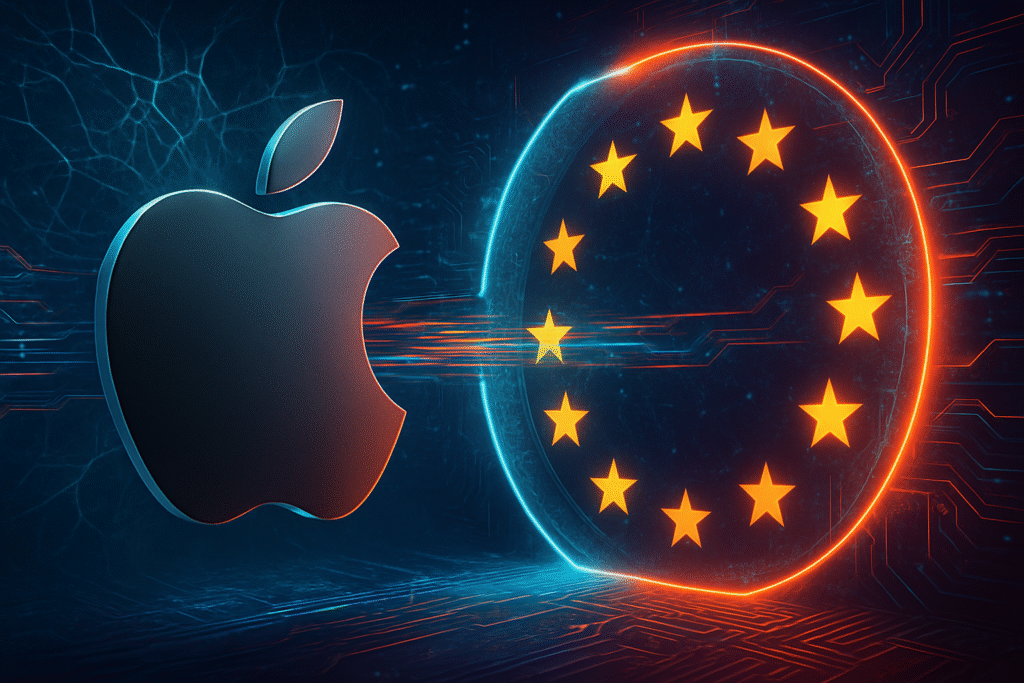Apple’s High-Stakes Legal Battle: A Defining Moment for Big Tech Regulation
By:
TokenRing AI
October 21, 2025 at 14:58 PM EDT

In a landmark legal confrontation, Apple Inc. (NASDAQ: AAPL) has launched a comprehensive challenge against the European Union's ambitious Digital Markets Act (DMA), setting the stage for an unprecedented antitrust court test that could reshape the global regulatory landscape for technology giants. As of October 21, 2025, Apple's lawyers are presenting oral arguments before the EU's General Court in Luxembourg, initiating its broadest legal attack yet on a regulation designed to curb the power of "gatekeeper" platforms. This legal battle is not merely about a single company; it represents a pivotal moment in the ongoing struggle between national sovereignty and corporate control over the digital economy, with profound implications for innovation, competition, and consumer choice. The immediate significance of this challenge is immense. The outcome will not only dictate the future of Apple's tightly controlled ecosystem in the EU but also establish crucial precedents for how the DMA, and potentially similar regulations worldwide, are enforced. A favorable ruling for Apple could weaken the EU's regulatory teeth, while an EU victory would solidify its position as a global leader in digital antitrust, forcing significant changes across the tech industry. The Legal Gauntlet: Apple's Core Arguments Against the DMAApple's legal offensive is multifaceted, targeting key provisions of the DMA that the company argues are "hugely onerous and intrusive" and threaten its foundational principles of user privacy, security, and intellectual property. The Digital Markets Act, largely applicable since May 2023, identifies dominant online platforms like Apple as "gatekeepers" and imposes specific "do's and don'ts" to prevent anti-competitive practices, such as favoring their own services or locking in users and businesses. The EU's motivation stems from a desire to foster a fairer digital economy and counter what it perceives as the "supernormal profits" derived from gatekeepers' control over their ecosystems. Central to Apple's challenge are three primary areas:
Apple's legal counsel, Daniel Beard, has asserted that the DMA's demands "ignore the protection of property rights and issues of privacy and security, which are vital to EU citizens." Furthermore, Apple claims the law has hindered its ability to roll out new features, such as enhanced Siri capabilities and Apple Intelligence integrations, in the EU, suggesting a chilling effect on innovation. This contrasts sharply with the EU's stance, which dismisses Apple's security concerns, stating that "nothing in the DMA requires companies to lower their privacy standards, their security standards." Reshaping the Competitive Landscape: Implications for Big Tech and StartupsThe outcome of Apple's legal challenge carries significant competitive implications for not only Apple (NASDAQ: AAPL) but also other designated gatekeepers such as Alphabet (NASDAQ: GOOGL), Amazon (NASDAQ: AMZN), ByteDance, Meta Platforms (NASDAQ: META), Microsoft (NASDAQ: MSFT), and Booking Holdings (NASDAQ: BKNG). A ruling upholding the DMA would likely force Apple to open up its ecosystem further, leading to potential disruptions in its existing business models and revenue streams, particularly from the App Store. This could manifest as increased competition in app distribution, payment processing, and hardware accessories, potentially eroding Apple's walled-garden advantage. For other tech giants, an EU victory would reinforce the precedent that regulators are willing and able to impose stringent controls on market-dominant platforms. This could accelerate similar legislative efforts globally and encourage more aggressive enforcement of existing antitrust laws. Companies like Alphabet and Meta, also subject to DMA obligations, would face renewed pressure to comply with provisions like allowing greater interoperability and enabling alternative app stores or payment systems. Conversely, a win for Apple could embolden other gatekeepers to challenge DMA provisions, potentially slowing down or even derailing the EU's broader digital market reform agenda. This scenario might allow major tech companies to maintain their current market positioning and strategic advantages, continuing to leverage their ecosystem control to promote their own services. For startups and smaller developers, the DMA promises a fairer playing field, with greater access to users and reduced reliance on gatekeeper platforms. If Apple's challenge succeeds, these benefits could be delayed or diminished, perpetuating the existing power imbalances in the digital economy. A Broader Battle: Digital Sovereignty and Global RegulationApple's legal fight is more than just a corporate dispute; it is a critical front in the broader global trend towards increased regulation of Big Tech. The DMA itself is a cornerstone of the EU's strategy to assert digital sovereignty and create a more integrated Digital Single Market. This case will test the limits of that ambition and potentially influence similar legislative initiatives in the United States, the UK, and other jurisdictions grappling with the market power of tech giants. The debate centers on balancing innovation with competition and consumer welfare. While Apple warns of compromised security and privacy, the EU maintains that the DMA aims to enhance consumer choice, foster innovation by smaller businesses, and ultimately lead to better and more affordable services. This clash highlights fundamental differences in regulatory philosophies, with the EU prioritizing market contestability and user empowerment, while Apple emphasizes its proprietary ecosystem as a guarantor of quality and security. This legal battle can be compared to historical antitrust milestones, such as the U.S. government's case against Microsoft in the late 1990s, which ultimately led to significant changes in how the company operated. While the specific context differs, both cases represent a governmental effort to rein in dominant technology companies perceived as stifling competition. The outcome here will signal whether regulators can effectively challenge the pervasive influence of today's tech behemoths or if corporate power will continue to outpace legislative efforts. The Road Ahead: Long-Term Implications and Expert PredictionsThe legal proceedings are expected to be lengthy. While oral arguments are underway as of October 21, 2025, a decision from the EU's General Court is not anticipated for another 12-18 months. Any ruling is almost certain to be appealed to the EU's highest court, the Court of Justice of the European Union, meaning a final resolution could take several years. This extended timeline creates a period of uncertainty for Apple and other gatekeepers, potentially delaying strategic decisions and product roadmaps in the EU. Should the DMA's provisions be upheld, Apple would likely be forced to implement significant changes. This could include allowing third-party app stores on iOS devices, enabling alternative payment systems within apps without incurring Apple's commission, and opening up its hardware and software to greater interoperability with competing products. These changes could lead to new applications and use cases, fostering a more diverse and competitive mobile ecosystem. Challenges will include ensuring that any mandated openness does not genuinely compromise user security or experience, a balance that both regulators and tech companies will need to address. Experts predict a tough fight for Apple, given the EU's strong track record in antitrust enforcement and its clear legislative intent behind the DMA. However, Apple's legal team is formidable, and its arguments regarding security and privacy resonate with many consumers. What happens next will largely depend on the General Court's interpretation of the DMA's scope and its assessment of Apple's claims regarding the law's impact on its intellectual property and security architecture. The ongoing transatlantic tensions regarding digital regulation also suggest that the political ramifications of this case will extend far beyond the courtroom. A Defining Chapter in Digital RegulationApple's legal challenge against the EU's Digital Markets Act marks a defining chapter in the history of digital regulation. The core takeaway is the fundamental clash between a powerful corporation's control over its ecosystem and a sovereign entity's ambition to foster a fairer, more open digital market. The significance of this development in AI and tech history cannot be overstated; it represents a major stress test for modern antitrust law in the face of increasingly integrated and dominant digital platforms. The long-term impact will reverberate across the tech industry, influencing how companies design products, interact with developers, and compete for users. Should the EU prevail, it will solidify its reputation as the world's leading tech regulator, potentially inspiring similar legislation globally. If Apple finds success, it could slow down the momentum of such regulatory efforts, raising questions about the efficacy of antitrust laws in the digital age. In the coming weeks and months, all eyes will be on the proceedings in Luxembourg, as well as any further enforcement actions by the European Commission against Apple or other gatekeepers. The legal arguments, expert testimonies, and ultimately, the court's decision, will provide invaluable insights into the future direction of digital market governance and the delicate balance between corporate innovation and public interest. This content is intended for informational purposes only and represents analysis of current AI developments. TokenRing AI delivers enterprise-grade solutions for multi-agent AI workflow orchestration, AI-powered development tools, and seamless remote collaboration platforms. More NewsView More
DoorDash’s Recent Stock Dip Equals 60% Upside ↗
Today 12:15 EST
Via MarketBeat
Tickers
DASH

Wall Street Loves Williams-Sonoma Right Now—Here’s Why the Stock Could Soar in 2026 ↗
Today 10:22 EST
Via MarketBeat
Tickers
WSM

Meta Wins FTC Fight, Keeps Instagram Growth Machine Intact ↗
Today 10:17 EST
Via MarketBeat
Tickers
META

Via MarketBeat
Tickers
SBUX

MP Materials Stock Soared After Earnings—Here’s the Real Reason ↗
November 22, 2025
Via MarketBeat
Recent QuotesView More
Stock Quote API & Stock News API supplied by www.cloudquote.io
Quotes delayed at least 20 minutes. By accessing this page, you agree to the Privacy Policy and Terms Of Service.
© 2025 FinancialContent. All rights reserved.
|